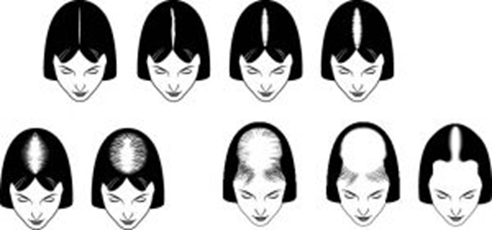
Hair loss is devastating for women as it is associated with their looks and is a source of beauty. So, when they face hair loss, it is more of an emotional issue.
There was a myth in the past that Hair Transplant was meant for men only. But, that was proved false when women started opting for Hair Transplants for their hair loss issue. However, the percentage of women going for Hair Transplants compared to men is significantly low.
Reasons for hair loss in women

Androgenic Alopecia
The hair loss in women is mainly due to Androgenic Alopecia. It is more of a hereditary issue. It is caused by a genetically shorter hair-growing period and a longer period between the shedding and growth phases. It is similar to male pattern baldness, except that hair loss tends to occur in a different pattern. Even the genes from parents can affect the hair, causing thinner strands and smaller hair follicles. In Androgenic Alopecia, the hair’s growing phase slows down. It also takes a longer period for new hair to start growing. Hair follicles shrink causing the hair that grows to be thinner and finer. Ultimately, it results in hair breakage.
Alopecia Areata
Alopecia areata is an autoimmune disease. When there is alopecia areata, cells in the immune system surround and attack the hair follicles causing the attached hair to fall out. The more hair follicles that the immune system attacks, the more hair loss will occur. Hair transplant is contraindicated in alopecia areata.
Medical Treatment
Some medical treatments like chemotherapy and certain medications can cause hair loss as a side effect.
Pregnancy
A large number of hair will fall out during the resting period after pregnancy. Excessive hair fall might happen 3-4 months after delivery
Hormonal imbalances
The hair may start falling out due to hormonal disturbances which can occur in thyroid disorders, menopause, etc.
a longer period for new hair to start growing. Hair follicles shrink causing the hair that grows to be thinner and finer. Ultimately, it results in hair breakage.
Alopecia Areata
Alopecia areata is an autoimmune disease. When there is alopecia areata, cells in the immune system surround and attack the hair follicles causing the attached hair to fall out. The more hair follicles that the immune system attacks, the more hair loss will occur. Hair transplant is contraindicated in alopecia areata.
Medical Treatment
Some medical treatments like chemotherapy and certain medications can cause hair loss as a side effect.
Pregnancy
A large number of hair will fall out during the resting period after pregnancy. Excessive hair fall might happen 3-4 months after delivery
Hormonal imbalances
The hair may start falling out due to hormonal disturbances which can occur in thyroid disorders, menopause, etc.
Two types of Hair Transplant methods
- FUE (Follicular Unit Extraction)
- FUT (Follicular Unit Transplant)
FUE (Follicular Unit Extraction)
FUE is considered to be the ideal method of Hair Transplant in women. This method involves extracting follicular units from the donor area and transplanting them into the recipient area. The follicular units or, in other words, grafts contain one to four hairs in a single unit. Single-haired hair grafts are usually placed along the hairline, and two, three, and four-strand graft units are placed behind a follicular hair unit to create a denser hair appearance. This method makes the transplanted hair look quite natural.
FUT (Follicular Unit Transplant)
FUT is a surgical method where a strip of hair is taken from the donor area (Back or sides of the scalp) After harvesting, the extracted hair strip is divided into follicular unit grafts. These grafts are transplanted via tiny incisions to where they are needed to restore hairline and hair density in the balding area.
Advantages of Hair Transplant in women
- Hair Transplant is a permanent solution for hair loss in women.
- The Results are quite natural and good looking.
- It can enhance the attractiveness of the women and boost up their confidence.
